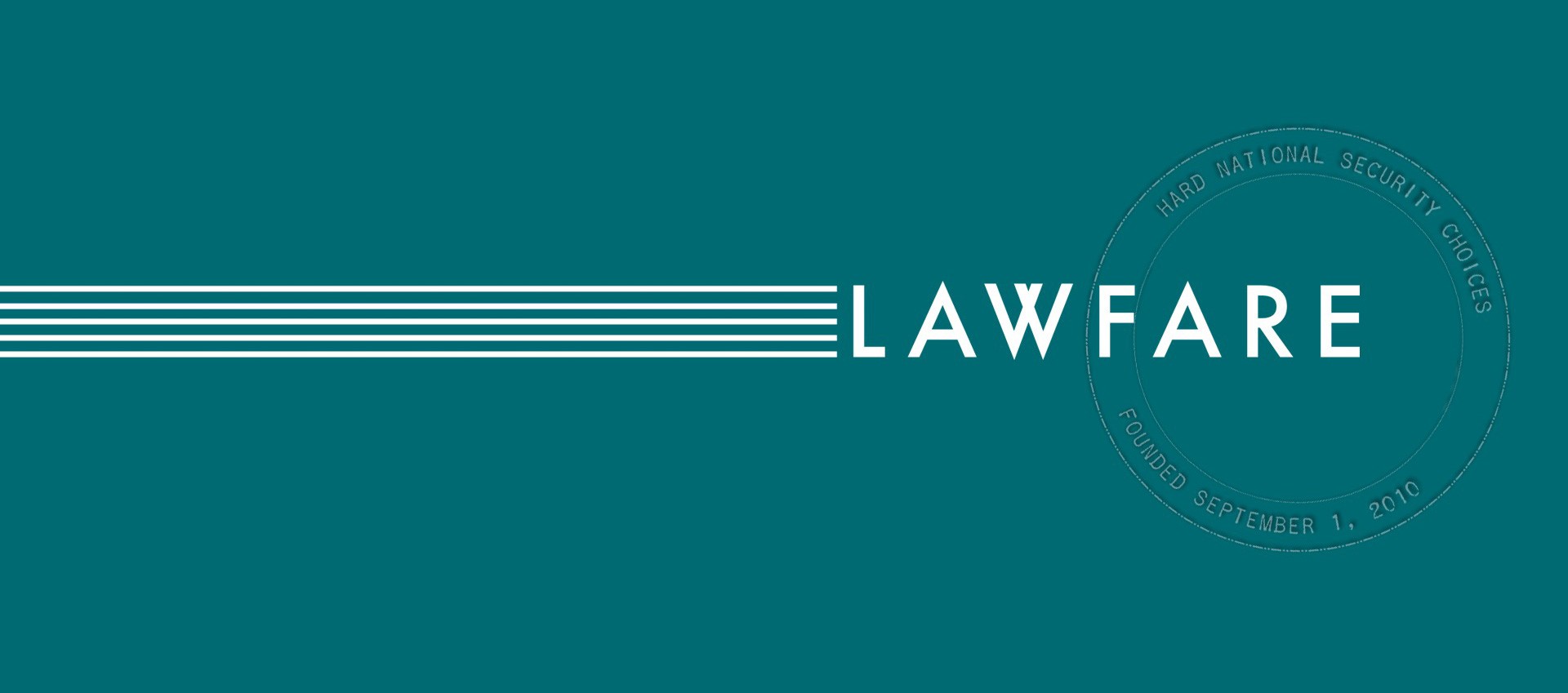Published by The Lawfare Institute
in Cooperation With

Quinta Jurecic discussed how interviews with Jan. 6 Committee staffers have helped to contextualize the committee’s report and findings, and how the committee's expansive and detailed archive can help the public draw its own conclusions about the insurrection.
On the Lawfare Podcast, Molly Reynolds sat down with Ryan Reilly to identify key law enforcement failures in the lead-up to Jan. 6 and discuss how agencies might address these deficits:
Scott R. Anderson analyzed recent unusual proceedings in the D.C. Circuit Court of Appeals earlier this week, including an almost unprecedented overnight briefing schedule. While the investigation remains largely under seal, Anderson suggested a few possible explanations for the "weird" proceedings' rapid pace.
Katherine Pompilio shared a letter from Reps. Jim Jordan (R.-Ohio), James Comer (R.-Ky.), and Bryan Steil (R.-Wis.) to Manhattan District Attorney (DA) Alvin Bragg, in which the legislators demand information about a potential indictment of former President Donald Trump.
Pompilio also shared Bragg’s response to the Republicans’ letter. The Manhattan DA's response stated that the representatives have demonstrated no legitimate legislative reason for congressional oversight of the investigation and characterized the representatives' claim that the investigation is politically motivated as “unfounded.”
Avery Schmitz shared a motion filed by former President Trump to quash the final report produced by a Fulton County special purpose grand jury, which details the extent to which Trump and his staffers interfered in the 2020 Georgia election.
Anderson sat down with Charles Dunst on the Lawfare Podcast to discuss strategies for improving the effectiveness of democracies, overcoming the appeal of authoritarian government, and how his suggestions for domestic policies translate into foreign policy:
Ms. Constitution, an Iranian woman whom Lawfare agreed to publish under a pseudonym for safety concerns, explained how Iran’s current constitution lacks legitimacy and empowers a repressive regime. She recounted how the 1979 constitution was overhauled 10 years later in a “silent coup” which replaced republican clauses with sanction policies that limit progressive social movements in Iran.
Jonathan Lord argued that since invading in 2003, the U.S. strategy in Iraq has continued down a tenuous path. Lord identified U.S. government missteps in the country, highlighting poor interagency coordination and inadequate delivery of military aid to regional partners.
On the Lawfare Podcast, Anderson sat down with Ambassador Doug Silliman and Salem Chalabi to discuss the legacies of the U.S. invasion in Iraq, internal challenges faced by the Iraqi people, and the status of diplomatic relations with the United States:
In the latest installment of Lawfare’s foreign policy essay series, Seth Jones analyzed the human costs of Russia’s full-scale invasion of Ukraine using quantitative evidence. Jones emphasized that attrition tactics have proven especially deadly in recent months.
Rhiannon Neilsen considered moral debates about just-war theory in light of the Russia-Ukraine war. She argued that requiring a narrowly-defined likelihood of success as a necessity for just war may be problematic, and that a wider redefinition of what constitutes “success” is necessary to morally evaluate self-defense in the face of aggression.
Lauren Kahn explained how the Defense Department’s update to its guidance on autonomous weapons systems brings clarity and establishes transparent governance and policy in the autonomous technologies field amid the increased use of autonomous weapons in the Russia-Ukraine war and the rapid development of the technology.
Jim Dempsey identified deficits in corporate compliance with cybersecurity protocols and the imperative of upgrading enforcement mechanisms to protect consumers. Dempsey highlighted self-assessment and third-party auditing as key factors for enforcement, in the first installment of a three-part series for Lawfare.
Justin Sherman analyzed two pieces of legislation that seek to grant the executive branch the power to block transactions associated with the import or export of Americans’ sensitive data to mitigate national security risks. He argued that the new legislation improves on past proposals by establishing a risk framework and permitting a wide spectrum of executive responses.
On the Lawfare Podcast, Eugenia Lostri sat down with former Ambassador Karen Kornbluh, lead author of the German Marshall Fund’s new report, “The New American Foreign Policy of Technology.” They discussed why there’s a need to rethink U.S. foreign policy, how to center democratic values, and the cruciality of a multistakeholder approach to foreign policy:
On the Lawfare Podcast, Stephanie Pell sat down with Travis LeBlanc to discuss the reauthorization of FISA Section 702, the likelihood of government infringement on individual privacy, and opportunities for reform:
Mark MacCarthy advocated for legislation to codify a system for holding platforms liable and protecting users from harmful content online, modeled after the European Union’s Electronic Commerce Directive and Digital Millennium Copyright Act.
Winnona DeSombre Bernsen delineated challenges unique to regulating tools sold by cyber mercenaries and concluded that export controls are insufficient mechanisms to control the sale of intangible technologies.
In the latest installment of Lawfare’s Aegis: Security Policy in Depth paper series, John Arquilla categorized threats to undersea cable networks and raised solutions for policymakers.
Robert Loeb provided a synopsis of Bahlul v. United States, outlining arguments that support and refute whether the current system of appointing the military commission convening authority is constitutional under the Appointments Clause.
On Rational Security, Anderson, Jurecic, and Alan Rozenshtein sat down to discuss the week’s big national security news stories, including Donald Trump’s looming indictments, Ron DeSantis’s recent characterization of the Russia-Ukraine was as a “territorial dispute,” the 20th anniversary of the U.S. invasion of Iraq, and more:
And on Chatter, David Priess sat down with Cynthia Nicoletti to discuss the intersection of history and law, what the Constitution does and doesn’t say about treason, the prosecution of former President of the Confederate States of America Jefferson Davis, and how lessons learned from the 1860s can help address modern-day calls for secession:
And that was the week that was.




